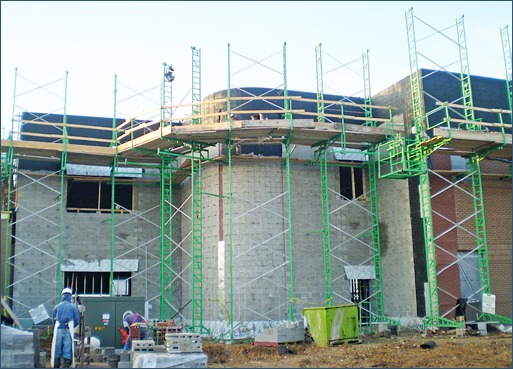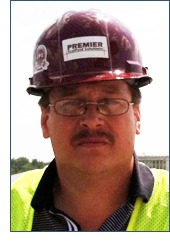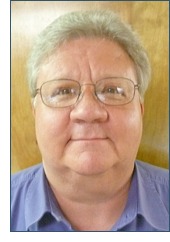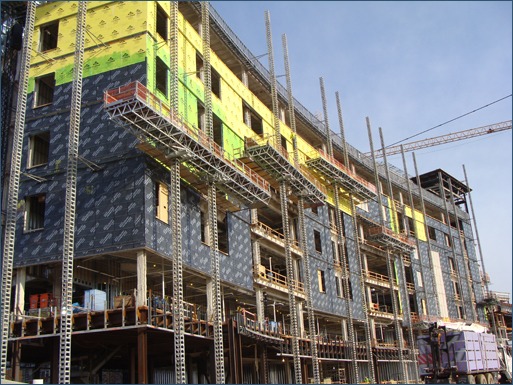Scaffolding
The Scoop on the Scaffolding Industry

As the economy evolves into a “new normal,” each facet of the masonry industry is affectedly a little differently. To get a snapshot of how current economic times are affecting the scaffolding industry, Masonry consulted two of the top leaders in that arena. Weathering this storm has called for the truest forms of leadership. Only the fittest have survived, so here’s some insight to how that was possible.
We talked to Michael D. Solomon, national sales manager for TNT Equipment Co. and Premier Scaffold Solutions, and Justin Breithaupt Jr., co-owner??of Non-Stop Scaffolding Inc., to ask what it has taken to stay afloat during the last few years, and what the fallout has been. We even asked them to peek into the future. Following is what they had to say.
 Solomon: The year 2011 has seen some improvement for sure. We’re still far out from where the industry was four years ago, but things are going in the right direction, from our view point. I feel that, if everything continues to climb slowly, with the current uptrend, there’s no reason not to believe that 2012 will be better than 2011 has been, and should end up being.
Solomon: The year 2011 has seen some improvement for sure. We’re still far out from where the industry was four years ago, but things are going in the right direction, from our view point. I feel that, if everything continues to climb slowly, with the current uptrend, there’s no reason not to believe that 2012 will be better than 2011 has been, and should end up being.
Breithaupt: We manufacture elevating scaffolding for mason contractors, and sell it all over the United States and Canada. The year 2011 has been about like 2010: down about 40 percent off a normal year. We are seeing it trying to come back, though. We think we’ll turn the corner in 2012, and start coming back up at least 30 percent. Canada’s economy seems to be doing better than the United States’ economy.
We have had more calls from mason contractors this year than any of the last four years. They are saying there seems to be more work coming out in 2012, and they are talking about buying our scaffolding, so they can operate leaner as they pick up more work. Our kind of scaffolding keeps their labor costs down. Every 100 feet of Non-Stop knocks about $8,400 per month off their payroll. That’s at the national average of $4,200 per mason, per month.
Solomon: One thing TNT has been able to offer our customers is an incredibly fast turnaround though our sister company, Premier Scaffold Solutions, on jobsite drawing. The drawings help with job planning, with using the ProSeries mast climbers on site. Having this information readily available means that the mason contractor will not only have the right equipment located on the jobsite in the best possible place for production and labor savings, but not more than needed, which would waste money and take his production and labor savings dollars away. We have also been able to produce special equipment that adapts to our ProSeries mast climbers to help in unusual?? jobsites or special needed configurations with great speed though Premier Scaffold Solutions on our Washington, D.C., job.
 Breithaupt: During the last three years, we have concentrated on making our scaffolding more versatile. Contractors have traditionally viewed elevating scaffolding as only for long, straight walls, but we’ve changed all that. Since jobsites seem to be getting tighter and tighter, we have developed some universal accessories that fit all Non-Stop products, and allow you to turn corners and scaffold radius walls just as fast as straight walls. Moving from wall to wall is four-times faster than conventional scaffolding, at one-fifth of the labor cost.
Breithaupt: During the last three years, we have concentrated on making our scaffolding more versatile. Contractors have traditionally viewed elevating scaffolding as only for long, straight walls, but we’ve changed all that. Since jobsites seem to be getting tighter and tighter, we have developed some universal accessories that fit all Non-Stop products, and allow you to turn corners and scaffold radius walls just as fast as straight walls. Moving from wall to wall is four-times faster than conventional scaffolding, at one-fifth of the labor cost.
Speaking of tight jobsites, in some places, it’s gotten hard to use a standard forklift. And some walls on tight sites are higher than typical forklifts can reach. We have developed a hoist mounting accessory that allows you to place a Betamax hoist anywhere along the scaffold. On long walls, you can even use more than one hoist. You can hoist bricks, blocks and mortar through a trap-door in the laborer’s platform as high as 200 feet. It’s good for inside work, where the floors are load-rated. You could feed the scaffold on a tall job with nothing more than a Bobcat.
Solomon: We deal with this issue with both our companies and take it very seriously. I, personally, have had the pleasure of doing many training classes all over the United States. More recently, Kevin O’Shea with the IPAF and I completed a safety awareness course on mast climbers in Washington, D.C., for OSHA compliance officers and management.
As far as Premier Scaffold Solutions, we’re always looking for a safer way to allow the masons get more production and the owners to save more labor time. Our R&D department is working hard right now on a new product that I can’t talk about right now, but it’s very design will help in production and labor savings for the end-user.
Breithaupt: OSHA has really cracked down on scaffolding. Non-Stop scaffolding, by design, eliminates the many reasons contractors get citations on conventional scaffolding. In addition, we have many built-in safety features that contribute to our spotless track record: Non-Stop has never collapsed in use.
Nowadays, it’s more about training. Our reps train our customers’ men in all aspects of the scaffolding, and we issue OSHA wallet cards to verify they’ve been trained. The contractor can administer the same training to new hires with the written safety course that comes with our equipment. It provides written proof the men are properly trained. It is accepted by OSHA and the Corps of Engineers.
Solomon: Cost seems to have gone back and forth, but overall, costs have gone up and, as of right now, our plan is not to raise any prices to our customers in these trying times, if at all possible.
Breithaupt: We use only high-tensile tubing for our towers, and its cost has gone up about 30 percent during the last two years. Because it’s such a specialized type of high-grade tubing, we have to buy about nine months’ worth of it at a time, and the price varies a lot, depending on the steel market. Other types of steel we buy vary, too.

Solomon: Like many others, TNT has had to make tough choices and lay a few employees off to make sure our company made it to the other side of these trying economic times. We have hired a few positions back as work picked up. With Premier Scaffold Solutions, our staff has stayed just about the same, since we have had a large amount of equipment needed for the Washington, D.C., job, not to mention we have had to make many special items for the job as well.
Breithaupt: Our staff is down about 40 percent, compared to three years ago. We expect to rehire in 2012.
Solomon: I hope to see all the mason contractors at the World of Masonry/World of Concrete in 2012. It’s sometimes hard when things are this economically tough to make it to the show. But, if it’s at all possible, I hope everyone can show their support for an industry that has treated most of us well in the past, and I feel is coming back right now and going to be stronger in the future. By coming to WOC, not only do you support the very industry that you work in, but you may pick up some information on equipment or supplies that can save you money on labor and/or production. This, in turn, may just help you get that next winning bid. If, by chance, you do come to WOC, please stop by our booth at Premier Scaffold Solutions to see how our mast climbing equipment can save you labor dollars and increase production with quality equipment made with American pride in the U.S.A. Good luck to everyone next year and into the future. Remember, with no risk, there’s no reward!
Breithaupt: Lately we’ve seen a shift in the thinking of the contractors buying our scaffolding. They are concerned with managing their costs now??more??than anytime I can remember. I am really thankful we are in the business of making a labor-saving device, instead of some useless luxury that could be easily cut out of the budget.
When everyone was covered up with work, they were buying our scaffolding to increase production and, hopefully, cut 30 percent off the job duration. Now, with work being scarce in many places, they are buying Non-Stop to cut back on their crew size, and, therefore, their weekly payroll, and still finishing the work on time. They are concerned with pay-back time, now more than ever. They are realizing they only need four months of work ahead to justify buying Non-Stop scaffolding.